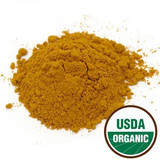

NuHerbs Lab Tested
Andrographis Herb (Chuan Xin Lian) - Cut Form 1 lb. - Nuherbs
Herbal Information for Andrographis Herb in Cut Form
Common Name: Mulberry Leaf
Botanical Name: Morus Alba, Morus bombycis, Morus australis, Morus multicaulis
Chinese / Pin Yin Name: Sang Ye, Sang bai pi
Mulberry Leaf Dosage: Follow your doctor's instructions for how to use this herb.
Mulberry Leaf Precautions: Do not use if nursing or pregnant.
Mulberry Leaf is a traditional Chinese medicinal herb that clears liver and lung heat, moistens dryness and disperses wind heat. Mulberry Leaf benefits eye health, promotes digestive health, supports cardiovascular health, promotes a healthy immune system, benefits the nervous system and supports bone and muscle health. Mulberry Leaf has analgesic, antibacterial, anti-inflammatory, nervine, diuretic and hypotensive effects.
Mulberry Leaf Properties: Cold, Bitter, Sweet
Mulberry Leaf Channels / Meridians: Lung, Liver
Mulberry Leaf Naturally Occurring Components: Rutin, Quercetin, Isoquercitrin, Astraglin, Vitamin B1, Vitamin B2, Vitamin C, Vitamin E, Tannin, Trigonelline
Schizonepeta Scutellaria Baicalensis Couchgrass
References: https://herbpathy.com/Uses-and-Benefits-of-Sang-Ye-Cid3613, http://alternativehealing.org/sang_ye.htm, https://www.ncbi.nlm.nih.gov/pmc/articles/PMC2935155/, https://www.naturalpedia.com/mulberry-leaf-sources-health-benefits-nutrients-uses-and-constituents-at-naturalpedia-com.html


NuHerbs Lab Tested
Herbal Information for Andrographis Herb in Cut Form


Nu Herbs Lab Tested
Uncaria spp. (Gou Teng): The Hooked Vine That Calms the Mind and Balances the Body Few herbs in the world of Traditional Chinese Medicine offer the remarkable versati


Herbal Information for Eleuthero Root in Organic Powder Form Eleuthero root powder is a versatile and powerful herb that offers a host of benefits for the body and mind. Whether you're looking to...


Starwest Botanicals
Versatile 6x8 Reusable Muslin Bags: Your Eco-Friendly Solution for Tea Introducing Our Eco-Friendly 6x8 Reusable Muslin Bags: Versatile, Stylish, and Sustainable!


ActiveHerb
Cordyceps .9x Mushroom Extract Granules: Potent Energy and Immune Support Cordyceps mushroom extract granules are a concentrated form of the Cordyceps mushroom, specifically prepared for ease of


Nuherbs Organic
Herbal Information on Organic Japanese Bushy Knotweed Rhizome in Bulk Powder Form Hu Zhang: Unveiling the Miraculous Benefits of Japanese Knotweed Hu Zhang, also known as Jap


Thrive Through Fall: Immunity Power Herbs for a Healthier Season 1 pound each of Cut Astragalus Root, Cut Ginger, and Whole Forsythia Fruit. As the crisp autumn air arrives and the leaves begin...

ActiveHerb
Herbal Information for Raw Rehmannia Root Single Extract FormSheng Di Huang: A Comprehensive Overview


Z Natural Products
Herbal Information for Organic Turmeric Powder What Is The Historical Use Of Turmeric Root?Turmeric root has been used for over 4,000 years in various cultures for its medicinal, culinary, and


Plum Flower
Forsythia Fruit (Lian Qiao): Powerful Antiviral Herb for Immune Support, Detox, and Cold & Flu Relief in Traditional Chinese Medicine In traditional Chinese medicine (TCM) forsythia fruit is used...


ActiveHerb
Herbal Information on Isatis Root in 6X Extract Granule Form Unlocking the Power of Ban Lan Gen: A Comprehensive Guide to Isatis Root Powder Introducti


ActiveHerb
Herbal Information on Scutellaria Root in Concentrated Granules Comprehensive Guide to Huang Qin (Scutellaria Baicalensis)

